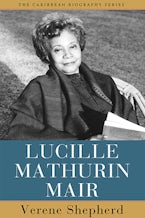PREFACE
As a history student at the University of the West Indies in the 1970s, it was inevitable that I would have been introduced to the work of Lucille Mathurin Mair, and later on in my life, I had the honour of meeting her. What struck me the first time I saw her in person as she gave a lecture on women and slavery at the Institute of Jamaica, however, was how impatient she was of historians who, in the face of archival evidence, pursued their political project of gender-blind history. As I developed in my career as a professional historian, I made sure that she could not count me among that derided group. Even though I met her a few more times between the late 1980s and when she died in 2009, I knew hardly anything about her background; and I would hazard a guess that neither did many Jamaicans, especially as she spent so much of her adult life out- side the island. Now, through this biography, I have had a chance to help others to understand this phenomenal woman and the reasons for her philosophy of life and ideological positions.
Readers should imagine my delight, how mi glad bag buss, when I was asked by the University of the West Indies Press to participate in its Caribbean Biography Series by writing this biography. It is a signal honour for me to write about a woman who over the course of her life embraced the multiple roles of professional historian, wife, mother, mentor, diplomat, national and international civil servant, legislator, and women’s rights activist; a woman who, through her scholar activism, successfully embodied and promoted the principles of justice and equality for women, especially women of the Global South; and someone recognized internationally for her activism in the struggle against all forms of discrimination and for the cause of peace and disarmament. Through interviews with her family, friends and colleagues, as well as through research of her own archives of speeches, lectures, letters, photographs and journal entries, the true measure of this marvellous woman, who served with such distinction at the national, regional and international levels, has been revealed and made accessible to a wider audience. This biography tells only part of a larger story that others will no doubt complete eventually.
Clearly, the decision to include Mair in the Caribbean Biography Series was a wise one, especially in light of her pivotal role in the journey to institutionalize gender studies at the University of the West Indies. Of course, she was far more than just an outstanding UWI woman. Among her voluminous boxes of papers, she has left a wealth of evidence of her contribution to the people of Cuba, Jamaica and St Lucia as well as to the United Nations and the academic and civil society communities in places where she delivered numerous lectures and speeches. She was a true citizen of the world, not just of the Caribbean, where she was born, grew up and lived most of her life. Mair’s work allowed us to understand resistance and decolonizing politics and the role of the historian in shaping collective memory.

